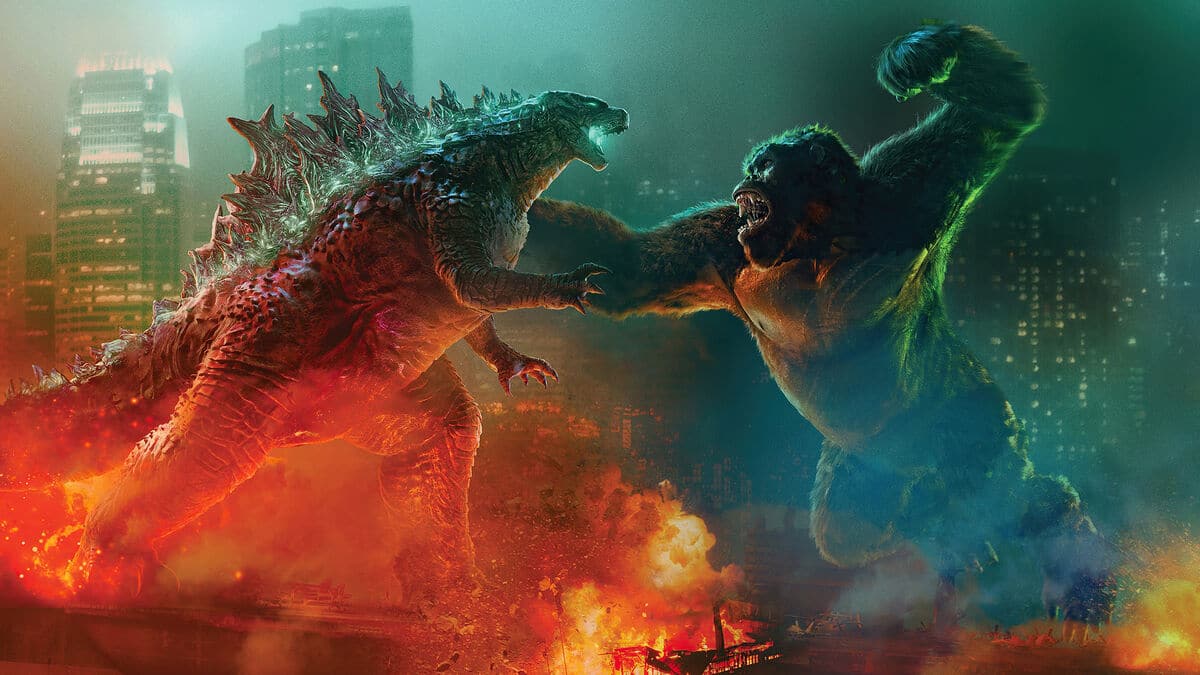NOTE: “Godzilla vs. Kong” is available to view in theatres here in North America, and elsewhere in the world wherever theatres are permitted to be open. It’s also available to stream for free at home via HBO Max for 31 days out from release in the U.S., before returning to HBO Max as an indefinite free streaming offering later this year. For markets outside of the U.S. that don’t offer HBO Max, “Godzilla vs. Kong” is available for at-home viewing via Premium Rental on supported VOD services. When possible, we recommend watching movies at home for the duration of the ongoing COVID-19 pandemic, for the safety of yourself and others. In the event that you do attend a movie theatre over the course of the ongoing pandemic however, please consult and follow public health guidelines in your region, and do not attend movie theatres if you feel unwell, or have been potentially exposed to COVID-19 through a known positive case.
FOR REFERENCE: This review of, “Godzilla vs. Kong” is based on at an-home viewing via Premium Rental
I can’t recall the last time I saw a movie so devoid of nuance or subversion or a genuine desire to take the blockbuster movie circuit somewhere new than Godzilla vs. Kong. What you see is really what you get with this movie, supposedly the climactic offering of Legendary Pictures’ MonsterVerse franchise that started with 2014’s American Godzilla movie reboot. It sounds like an insult at first blush, and I imagine to most critics and moviegoers that are inexplicably expecting more than what the title advertises, it probably would be. To me though, Godzilla vs. Kong is the loud, flashy, action-packed cinematic romp that the world needs right now.
Is it good? Well, in terms of how it’s presented, yes. Even the worst of the MonsterVerse movies have been visually stunning and impressive in scope, and Godzilla vs. Kong is, naturally, both visually stellar and loaded with truly amazing sound design. Is it deep though? Hell no. Another MonsterVerse hallmark, at least past its original Godzilla reboot, is its almost proud ability to underserve its human characters. Most of the time, the MonsterVerse formula simply demands that some recognizable actors, along with a whole lot of extras, spout exposition, and then stand there and gawk at an enormous CGI effect. This formula was appropriately cemented in 2019 with Godzilla: King of the Monsters, the previous MonsterVerse movie, along with the one that finally committed to making the monsters the stars, in turn pushing the humans entirely onto the sidelines, much to the scorn of many critics.
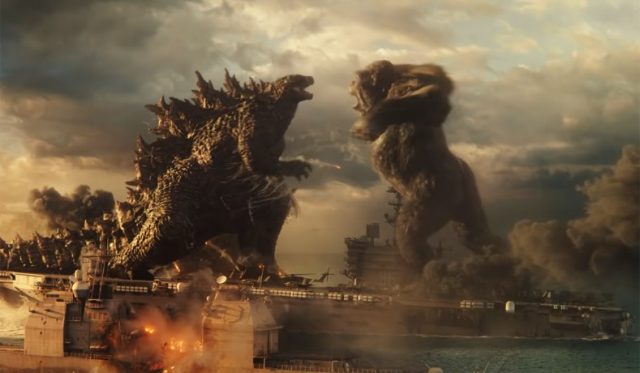
Again though, what can you really expect at this point? People cried out for giant monsters beating the hell out of each other, and wrecking entire cities as they did it, and while 2014’s Godzilla and 2017’s prequel/loose follow-up, Kong: Skull Island didn’t really provide that, 2019’s Godzilla: King of the Monsters quickly resigned itself to giving the people what they want, critics be damned. So, it’s no surprise that Godzilla vs. Kong finally feels like a truly direct follow-up to a prior work within a shared cinematic universe that’s mostly felt radically different between movies so far, at least beyond the presence of giant beasties. The difference now of course is that both of the MonsterVerse’s marquee beasties are battling each other. The human element still doesn’t matter, and it’s all good, dumb, colourful fun.
After the rough year that humanity has had throughout 2020, I can safely say that Godzilla vs. Kong, a defiantly dumb blockbuster that doesn’t care about being more than what its title bills it as, feels like the perfect movie to coax people back to theatres, for better or worse. Hopefully you have that option as well, because while this long-awaited crossover is still fun at home, it definitely demands to be experienced on the biggest screen possible.
Once again, there are almost no returning human characters from previous MonsterVerse movies in Godzilla vs. Kong. In this case, the only returning human personalities of note are Millie Bobby Brown, reprising her role as teenage supporting heroine, Madison Russell, and Kyle Chandler as Madison’s father, Mark Russell, who practically has a glorified cameo this time out. Zhang Ziyi was allegedly supposed to reprise her role from Godzilla: King of the Monsters as either Dr. Chen or Dr. Ling (or perhaps both) as well, though her role was apparently cut, alongside the mystery role that was planned for Iron Fist’s Jessica Henwick.
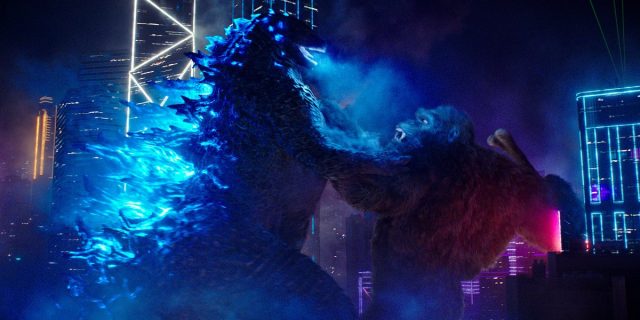
Instead, we get another batch of all-new human characters in Godzilla vs. Kong, who more or less exist as archetypes. Rebecca Hall and Alexander Skarsgard headline Godzilla vs. Kong’s core scientist narrative as two researchers that are tasked with transporting Kong to a power source that’s craved by a company called Apex Cybernetics, who are a transparently evil organization working on an agenda that should be obvious to any devout monster movie fan. Hall’s and Skarsgard’s characters are not interesting, and more or less exist to entirely spout exposition. Hell, at worst, Skarsgard practically feels like he’s playing his character from Zoolander again, if he were trying and failing to be taken seriously in blockbuster Hollywood. At first, I wasn’t even clear on what exactly Skarsgard’s character’s field even was, outside of weird monster conspiracy novels anyway. For reference, he’s a geologist.
It’s also unfortunately true that Godzilla vs. Kong can’t tap into one of its best human characters anymore, that being Ken Watanabe’s Dr. Serizawa, because he was unfortunately killed during the events of Godzilla: King of the Monsters. Oh, but we do get Serizawa’s son in Godzilla vs. Kong, played by Shun Oguri!… But that never really comes into the story. Hell, Ren Serizawa never even really brings up his father throughout the entirety of Godzilla vs. Kong! Instead, he’s a mere stooge of the movie’s human villain, Walter Simmons, played by Demian Bichir, who is, again, an obvious evil character with a blatant agenda that should be immediately known to any self-respecting fan of monster movies. Both Ren’s and Simmons’ entire characters are antagonists, and there’s nothing else to them.
Eiza Gonzalez registers a little bit more as Simmons’ daughter, Maia, who is saddled with the duty of babysitting Kong while Hall’s and Skarsgard’s characters transport him into the Hollow Earth. Unfortunately though, Gonzalez suffers as much as anyone under Godzilla vs. Kong’s relentlessly cheesy script, which further undermines its already lacking element of human storytelling. I wouldn’t necessarily say I’m surprised that the dialogue in Godzilla vs. Kong is almost intentionally awful, but that doesn’t change the fact that it’s almost intentionally awful. The MonsterVerse, for better or worse, is embracing its basest character impulses at this point, leaving the destructive glee of the monsters to take center stage, while the humans barely function like real, relatable people anymore.
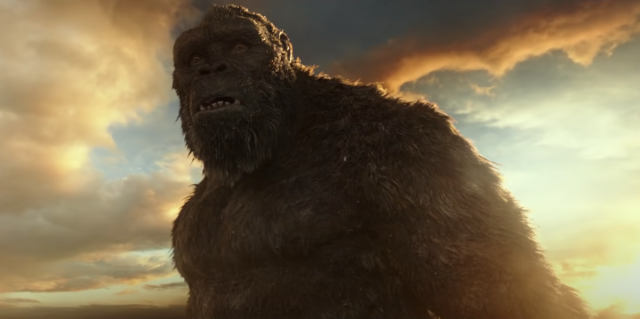
Arguably the actor that suffers most in Godzilla vs. Kong however is Millie Bobby Brown, though not through any fault of her own. Brown was definitely a standout in Godzilla: King of the Monsters, because she actually tried to convey an emotional stake in what was happening, while almost every other actor either hammed or sleepwalked through their performances. It’s unsurprising that Godzilla vs. Kong would want to bring Brown’s Madison Russell back again, on that note, but this time, she’s unfortunately stuck in a ‘comic relief’ storyline that isn’t funny, and more or less serves as a corny tee-up to the obvious twist behind events in Godzilla vs. Kong. Deadpool 2’s Julian Dennison as Madison’s buddy, Josh Valentine, and Joker’s Brian Tyree Henry as an online conspiracy theorist podcaster don’t fare much better as Madison’s allies, both of whom exist solely to perform increasingly tiresome, ineffectual comedy routines as a way of breaking up the monster-fueled action and exposition.
Surprisingly, one of the most effectively human characters in Godzilla vs. Kong is, funny enough, Kong. Kong carries a lot of this movie’s biggest heart and most emotional moments, something that’s also realized effectively through his bond with a deaf, orphaned native girl named Jia, played by newcomer, Kaylee Hottle, one of the only survivors of a storm-plagued Skull Island. This crossover movie features a lot more of Kong than it does Godzilla, on this note, with Kong serving as the ‘ambassador’ of sorts from the monster-oriented world of Hollow Earth, albeit one that also can’t be sustained in his natural environment anymore, forcing him to relocate. Godzilla, meanwhile, has become enraged for reasons unknown, existing as more of an antagonist this time, though one that still hasn’t really changed in character from the previous MonsterVerse movies. It all makes sense when everything is revealed, though as I mentioned, the big surprise behind this movie is probably one that monster movie fans will see coming a mile away.
Godzilla vs. Kong’s plot is, unsurprisingly, dirt simple. Anything else would undermine the movie’s pacing, as well as its all-important focus on the eponymous dueling monsters. The entire premise of the movie is designed around Kong no longer being able to live on Skull Island, necessitating a transfer to a new home within the Hollow Earth, an element of MonsterVerse lore that was established in previous movies. All the while, Godzilla is provoked into attacking humanity again, for reasons that are unknown to the general public. With Kong also being exposed as a potential alpha that threatens Godzilla’s place in the hierarchy of monsters, Godzilla predictably turns his attention to Skull Island’s resident giant ape champion to boot, who must fend off Godzilla while simultaneously trying to learn to trust humans amid a journey to a new home.
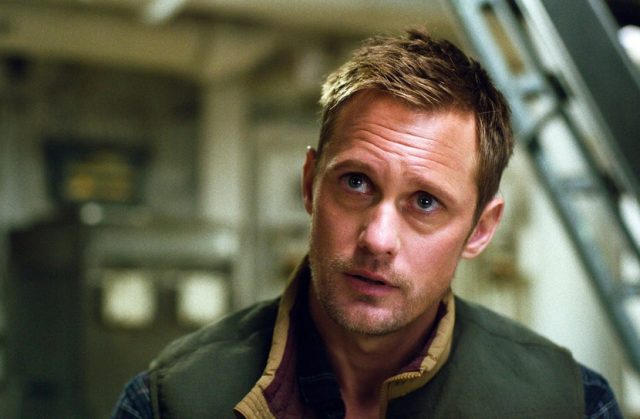
Much of the progression and final resolution behind Godzilla vs. Kong is aggressively predictable. Even while the movie does at least commit to trying to crown a true ‘winner’ in its titular duel, that duel is of course not the entire crux of the story progression, or even the climax. I don’t want to spoil any of the storytelling regardless (unless you opt to see my thoughts in the ‘Spoiler’ section below, of course!), but once you see the earliest peeks at Apex Cybernetics’ agenda, its role in the storyline becomes impossible to miss. Once again though, what can you really expect? Godzilla vs. Kong is all about the spectacle, and in terms of bringing Godzilla and Kong together into one massive blockbuster, it does succeed on that note. Sure, nothing else really feels like it matters, especially when the plot has a rather tenuous relationship to recognizable reality at the best of times, but I don’t imagine that monster enthusiasts are going to be terribly fussed with the window dressing around their giant-sized UFC match.
(NOTE: The ‘Spoiler’ section, when clicked, discusses whether Godzilla vs. Kong has any post-credits scenes, as well as whether it sets up any upcoming ‘MonsterVerse’ projects, or features any recognizable monsters beyond Godzilla and Kong themselves.)
As for whether Godzilla vs. Kong features any post-credits scenes, or any teases for future MonsterVerse projects, well, you might be disappointed to hear that none of these teases are present. There are no post-credits scenes whatsoever in Godzilla vs. Kong, and nor does it set up any potential MonsterVerse sequels for the future. In fairness, Godzilla vs. Kong was originally billed as the final movie in Legendary Pictures’ MonsterVerse franchise, so it’s not a complete shock that this long-awaited crossover doesn’t bother to sequel-bait. In a way, it’s actually kind of refreshing! Regardless, there has been a lot of fan support for more MonsterVerse movies, including a trending Twitter hashtag, #ContinuetheMonsterVerse, which has been acknowleged by Legendary. For now though, the plan seems to be for Godzilla vs. Kong to wrap up the MonsterVerse, at least in its current form, so at this point, this crossover movie will have to be treated as an overall finale, with no plans for future installments in the franchise.
It’s sort of funny to think about the fact that the MonsterVerse movies have never had a consistent director, even between direct Godzilla sequels. Adam Wingard is the latest director to be hired for the MonsterVerse, with Godzilla vs. Kong serving as his first triple-A blockbuster production. Curiously, Wingard was primarily known for horror movies before this, having directed 2016’s rather forgettable Blair Witch reboot, and 2017’s Japanese manga-adapted Netflix movie, Death Note, another movie that wasn’t well-received by many people. That would initially seem to spell trouble for Godzilla vs. Kong, but surprisingly, Wingard’s direction is better than you might expect. It’s not really unpredictable, more or less closely following the style of Michael Dougherty’s Godzilla: King of the Monsters direction from before this, but it’s competent, at least as far as the monster spectacle that people have come to see.
Wingard clearly went deep into the ambitious, imaginative world of Hollow Earth as well, crafting a secret landscape that feels very fantastical and packed with CGI, but also one that nonetheless inspires the imagination. Wingard clearly wanted the monsters throughout Godzilla vs. Kong to feel very believable and true to real-life nature, despite their staggering size and power. They move, act and battle as real animals would, and on that note, the resulting destruction that’s wrought around them isn’t even truly noticed. In terms of capturing a sense of awe at the sheer might of these larger-than-life monsters, Wingard nails Godzilla vs. Kong’s direction, making its effects-driven moments feel big and impressive, not to mention genuinely cool.
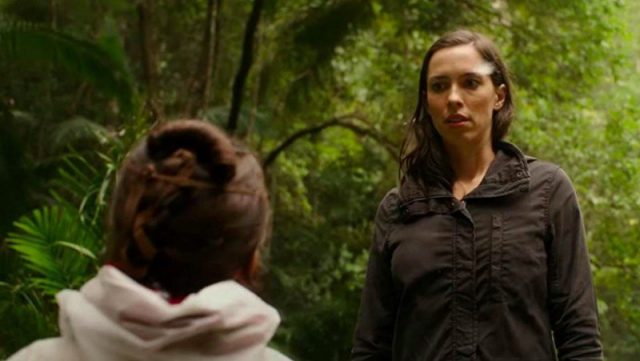
Where Wingard’s direction tends to falter however is throughout the fool’s errand of trying to make us care about the human characters in a movie that is very much about its titular monsters. Wingard appears to have tried to get around this innate disinterest in Godzilla vs. Kong’s human element by encouraging several of the actors to overact, especially in poor Millie Bobby Brown’s subplot, which is so full of annoying cringe comedy that you’d think you were watching one of Michael Bay’s Transformers movies!
In fact, I wouldn’t be surprised if Wingard was looking to the Transformers movies for inspiration here. Any characters outside of this weird comic relief plot with Brown’s returning Madison are pretty much entirely dedicated to exposition, delivering it very flatly and without much real intrigue to boot. Even during the moments of destruction, the actors too often sound disengaged from what’s going on, simply gawking at nothing in lieu of actual fear, and never truly conveying a sense of peril on the human level. There is at least a bit of a more successful human connection through Kaylee Hottle’s deaf orphan girl that has a bond with Kong, and is the only one that can truly communicate with Kong, but even this is barely explored beyond the surface level. It may be unsurprising, but if you’re going to come to Godzilla vs. Kong at all, you’d better be coming for the monsters.
Tom Holkenborg is the latest composer to come out of the MonsterVerse’s revolving door of ever-shifting talent, delivering a soundtrack for Godzilla vs. Kong that’s predictably engrossing and powerful. The MonsterVerse has usually impressed with its sound design throughout all of its four movies so far, but Godzilla vs. Kong feels like something particularly special. Monster nerds will no doubt get legitimate chills from the iconic roars of Godzilla and Kong sharing the screen together, while all of the destruction throughout the production feels just as deafening and glorious as you would expect. Another reason that Godzilla vs. Kong demands to be seen in theatres is the fact that its sound design is overall incredible, as it should be, considering that this is a blockbuster about two fan-favourite monsters clashing against one another.
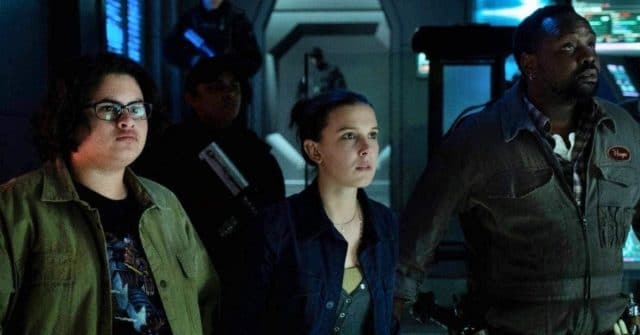
Holkenborg’s unpredictable, eclectic composing style also suits Godzilla vs. Kong very well. The way that Holkenborg uses Godzilla’s classic movie theme throughout the compositions feels particularly cool, punctuating all of the highlight moments of destruction during Godzilla’s global rampage. The rest of the soundtrack meanwhile relies on a mixture of alien-sounding synth, and a few more light-hearted compositions for the wonder-driven scenes about discovering monster settings and what have you. This music suite hits several of the notes that you would logically expect in a movie like Godzilla vs. Kong, but Holkenborg still injects enough of his trademark style to help this score stand out a little more than most blockbuster soundtracks.
Now that the MonsterVerse is no longer afraid to liberally show its monsters throughout most of its runtime, Godzilla vs. Kong can really flex its visuals. Unsurprisingly, this is a fantastic-looking movie, one that I imagine would leap to brilliant life on a theatre screen. If you can’t or won’t go to a movie theatre at this point however, and are stuck watching Godzilla vs. Kong at home (like I was), hopefully you at least have a large, 4K/HDR-enabled display, where you can better take advantage of this movie’s outstanding suite of visuals. The established designs for Godzilla and Kong alike continue to be fantastic, as do the designs for every other monster that’s featured, including some all-new creatures, along with some surprising favourites from previous MonsterVerse movies.
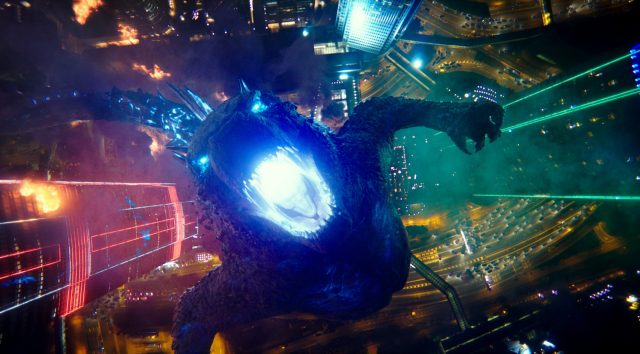
Godzilla vs. Kong raises the bar even further than previous MonsterVerse movies by featuring journeys to entire monster dwellings as well, with this crossover finally following through on the ‘Hollow Earth’ teases from prior MonsterVerse storylines. Finally, the MonsterVerse in its true form has come to humanity, and it’s truly a magnificent sight to behold. There’s a lot of great imagination put into the Hollow Earth settings, which I’d be remiss to spoil, though that’s not to say that the rest of the visuals are lacking. True to form, the sequences taking place throughout various human cities, which naturally get decimated by its eponymous warring creatures, are just as spectacular, even if they surprisingly don’t get as much focus as the fully monster-themed settings. I will say however that it finally feels like there’s a truly rich, untapped history to the world of the monsters, one that’s literally right underneath humanity’s feet! It’s enough to make you actively hope that this isn’t the last MonsterVerse movie, so audiences can keep exploring this colourful world in the future.
There isn’t anything to read into with Godzilla vs. Kong. It is what it is, and it doesn’t apologize for it. It’s brash, silly and disposable, but it’s also a lot of fun while it lasts. Most importantly though, Godzilla vs. Kong is the kind of movie that heavily justifies the theatrical experience, much more than Tenet and Wonder Woman 1984 ultimately did last year. It’s a big, epic production that’s ideally experienced on a massive theatre screen, particularly in a premium format like IMAX or UltraAVX.
Indeed, some of the impressive spectacle doesn’t fully translate when you’re forced (or simply elect) to watch Godzilla vs. Kong at home, even if you do happen to have the benefit of a 4K/HDR screen and/or souped-up home theatre speakers. There’s nothing else here beyond the innate appeal of watching Godzilla fight Kong, a destructive showdown that’s been built up for the better part of a decade now. That payoff deserves to be in a theatre, if you have that option, and if it’s safe to partake in it within your area. You can still enjoy two iconic monsters duking it out at home if that’s your only option, but that still doesn’t make home viewing the ideal option.
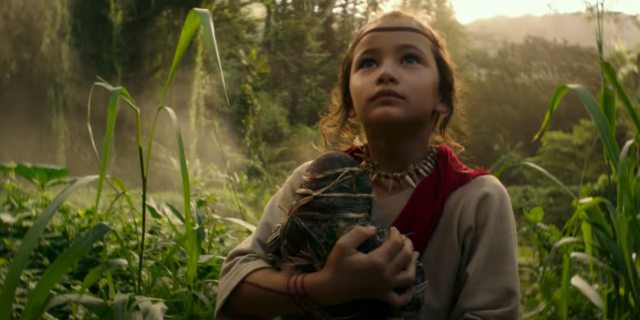
However you ultimately experience Godzilla vs. Kong, it’s an appropriate crescendo for the MonsterVerse; Big, bold and destructive, without any pesky depth or moderately developed human storytelling to take away from the fun. It’s the perfect remedy to a dour, depressing year that was punctuated by a drawn-out pandemic and widespread social upheaval, because it gives you what you want, and reminds you that sometimes it’s okay to embrace simplicity.

